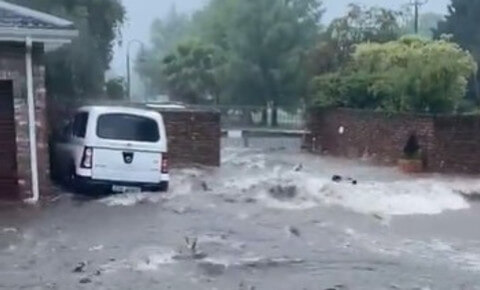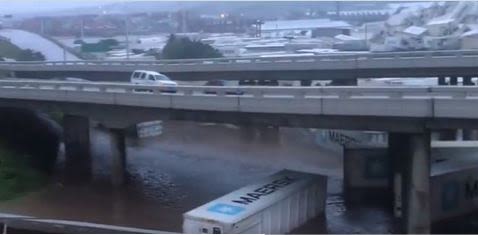Insurance companies are reporting a deluge of claims in the wake of the flood damage caused by torrential rains in KwaZulu-Natal.
As insurers face an increase in weather-related claims, what are the chances of getting cover in the midst of a natural disaster?
“They can’t be processing hundreds of claims every time a weather system beckons only to have the policies cancelled a week later when that risk recedes” comments Bruce Whitfield.
RELATED: Cost of KZN flood devastation: ‘I have no doubt insurers able to meet claims’
This is quite a common practice says Mehmood Sader, Head of Short Term Insurance at Gradidge-Mahura Investments, and as a result many insurers introduced specific restrictions.
… [these] would include any new business request in the affected areas unless the client can prove uninterrupted insurance for at least 12 months, together with a declaration of no claims or no current damages, which should be provided up front, as well as a possible survey to be conducted at their risk address.
Mehmood Sader, Head of Short Term Insurance – Gradidge-Mahura Investments
What does this mean for the insurance industry in the long term?
Whitfield also talks to Christelle Colman, founder and owner of Ami Sure underwriting managers.
Colman uses Cape Town’s summer fire season as a reference point, when people ask for more insurance to cover the risk of their home possibly burning down.
That is what we call ‘anti-selection’ – the rest of us who pay premiums throughout the year and we’re good risk shouldn’t be selected against someone who doesn’t want to pay the premium and cover the risk for the entire time.
Christelle Colman, Owner – Ami Sure
Colman says this is not the main issue facing the insurance industry, which is rather the increase in and severity of what she calls massive catastrophe events.
RELATED: SA Weather Service warns of more rainfall in flood-ravaged KZN over long weekend
Owners of beach- or river-front properties are already finding it difficult to get insurance she says.
It’s already happened in the Breede River Valley where there’s been continuous flooding of holiday homes situated on the river bank – those home owners can’t get insurance anymore… They have to self-insure and just hope they don’t have complete destruction of their property.
Christelle Colman, Owner – Ami Sure
Another example is fire insurance for thatched homes in St Francis Bay – they’ve become almost uninsurable.
Christelle Colman, Owner – Ami Sure
To a large degree, these “big change” decisions are forced onto insurance companies by the re-insurers she says.
They say the specific area identified is where the risk exposure is no longer sudden and unforeseen, but a given… and it’s become too expensive to cover these risks and they’re not prepared to carry the re-insurance.
Christelle Colman, Owner – Ami Sure
We’re starting to reach a point with some of these areas where there isn’t a price for the risk anymore, because it will happen.
Christelle Colman, Owner – Ami Sure
Focusing on KwaZulu-Natal, Colman says they have seen an increase in the frequency of events along the beachfront and rivers during the last ten to fifteen years.
If you’re considering buying an expensive waterfront house, make sure you understand the insurance implications she cautions.
Listen to the conversation on The Money Show:
 Copyright :
Copyright :Source : @ArriveAlive/Twitter
Content retrieved from: https://www.capetalk.co.za/articles/443152/owners-of-waterfront-properties-already-having-difficulty-getting-insurance.

